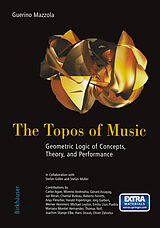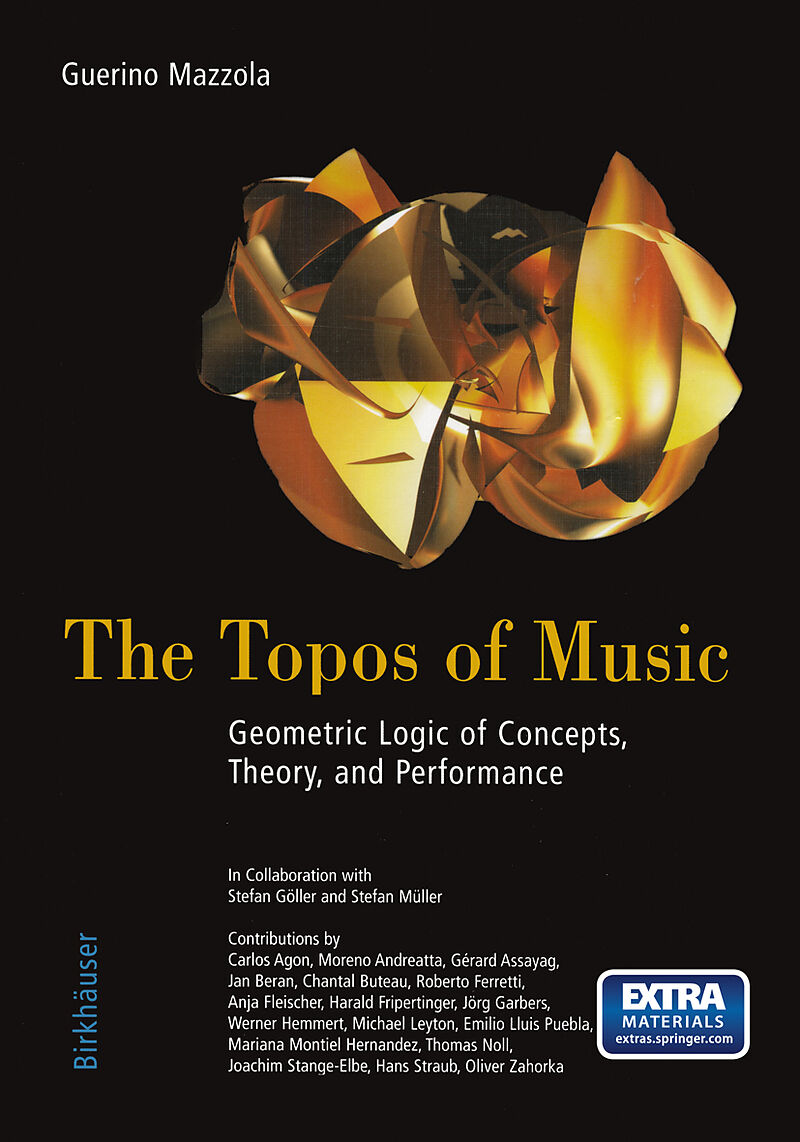The Topos of Music, w. CD-ROM
Einband:
Fachbuch
EAN:
9783764357313
Untertitel:
Geometric Logic of Concepts, Theory, and Performance
Genre:
Musik
Autor:
Guerino Mazzola
Herausgeber:
Springer, Basel
Auflage:
2002
Anzahl Seiten:
1344
Erscheinungsdatum:
2002
ISBN:
978-3-7643-5731-3
Man kann einen jeden BegrifJ, einen jeden Titel, darunter viele Erkenntnisse gehoren, einen logischen Ort nennen. Immanuel Kant [258, p. B 324] This book's title subject, The Topos of Music, has been chosen to communicate a double message: First, the Greek word "topos" (r01rex; = location, site) alludes to the logical and transcendental location of the concept of music in the sense of Aristotle's [20, 592] and Kant's [258, p. B 324] topic. This view deals with the question of where music is situated as a concept and hence with the underlying ontological problem: What is the type of being and existence of music? The second message is a more technical understanding insofar as the system of musical signs can be associated with the mathematical theory of topoi, which realizes a powerful synthesis of geometric and logical theories. It laid the foundation of a thorough geometrization of logic and has been successful in central issues of algebraic geometry (Grothendieck, Deligne), independence proofs and intuitionistic logic (Cohen, Lawvere, Kripke). But this second message is intimately entwined with the first since the present concept framework of the musical sign system is technically based on topos theory, so the topos of music receives its top os-theoretic foundation. In this perspective, the double message of the book's title in fact condenses to a unified intention: to unite philosophical insight with mathematical explicitness.
Includes supplementary material: sn.pub/extras
Klappentext
The Topos of Music is the upgraded and vastly deepened English extension of the seminal German Geometrie der Töne. It reflects the dramatic progress of mathematical music theory and its operationalization by information technology since the publication of Geometrie der Töne in 1990. The conceptual basis has been vastly generalized to topos-theoretic foundations, including a corresponding thoroughly geometric musical logic. The theoretical models and results now include topologies for rhythm, melody, and harmony, as well as a classification theory of musical objects that comprises the topos-theoretic concept framework. Classification also implies techniques of algebraic moduli theory. The classical models of modulation and counterpoint have been extended to exotic scales and counterpoint interval dichotomies. The probably most exciting new field of research deals with musical performance and its implementation on advanced object-oriented software environments. This subject not only uses extensively the existing mathematical music theory, it also opens the language to differential equations and tools of differential geometry, such as Lie derivatives. Mathematical performance theory is the key to inverse performance theory, an advanced new research field which deals with the calculation of varieties of parameters which give rise to a determined performance. This field uses techniques of algebraic geometry and statistics, approaches which have already produced significant results in the understanding of highest-ranked human performances. The book's formal language and models are currently being used by leading researchers in Europe and Northern America and have become a foundation of music software design. This is also testified by the book's nineteen collaborators and the included CD-ROM containing software and music examples.
Zusammenfassung
With contributions by numerous experts
Inhalt
I Introduction and Orientation.- 1 What is Music About?.- 1.1 Fundamental Activities.- 1.2 Fundamental Scientific Domains.- 2 Topography.- 2.1 Layers of Reality.- 2.1.1 Physical Reality.- 2.1.2 Mental Reality.- 2.1.3 Psychological Reality.- 2.2 Molino's Communication Stream.- 2.2.1 Creator and Poietic Level.- 2.2.2 Work and Neutral Level.- 2.2.3 Listener and Esthesic Level.- 2.3 Semiosis.- 2.3.1 Expressions.- 2.3.2 Content.- 2.3.3 The Process of Signification.- 2.3.4 A Short Overview of Music Semiotics.- 2.4 The Cube of Local Topography.- 2.5 Topographical Navigation.- 3 Musical Ontology.- 3.1 Where is Music?.- 3.2 Depth and Complexity.- 4 Models and Experiments in Musicology.- 4.1 Interior and Exterior Nature.- 4.2 What Is a Musicological Experiment?.- 4.3 QuestionsExperiments of the Mind.- 4.4 New Scientific Paradigms and Collaboratories.- II Navigation on Concept Spaces.- 5 Navigation.- 5.1 Music in the EncycloSpace.- 5.2 Receptive Navigation.- 5.3 Productive Navigation.- 6 Denotators.- 6.1 Universal Concept Formats.- 6.1.1 First Naive Approach To Denotators.- 6.1.2 Interpretations and Comments.- 6.1.3 Ordering Denotators and 'Concept Leafing'.- 6.2 Forms.- 6.2.1 Variable Addresses.- 6.2.2 Formal Definition.- 6.2.3 Discussion of the Form Typology.- 6.3 Denotators.- 6.3.1 Formal Definition of a Denotator.- 6.4 Anchoring Forms in Modules.- 6.4.1 First Examples and Comments on Modules in Music.- 6.5 Regular and Circular Forms.- 6.6 Regular Denotators.- 6.7 Circular Denotators.- 6.8 Ordering on Forms and Denotators.- 6.8.1 Concretizations and Applications.- 6.9 Concept Surgery and Denotator Semantics.- III Local Theory.- 7 Local Compositions.- 7.1 The Objects of Local Theory.- 7.2 First Local Music Objects.- 7.2.1 Chords and Scales.- 7.2.2 Local Meters and Local Rhythms.- 7.2.3 Motives.- 7.3 Functorial Local Compositions.- 7.4 First Elements of Local Theory.- 7.5 Alterations Are Tangents.- 7.5.1 The Theorem of MasonMazzola.- 8 Symmetries and Morphisms.- 8.1 Symmetries in Music.- 8.1.1 Elementary Examples.- 8.2 Morphisms of Local Compositions.- 8.3 Categories of Local Compositions.- 8.3.1 Commenting the Concatenation Principle.- 8.3.2 Embedding and Addressed Adjointness.- 8.3.3 Universal Constructions on Local Compositions.- 8.3.4 The Address Question.- 8.3.5 Categories of Commutative Local Compositions.- 9 Yoneda Perspectives.- 9.1 Morphisms Are Points.- 9.2 Yoneda's Fundamental Lemma.- 9.3 The Yoneda Philosophy.- 9.4 Understanding Fine and Other Arts.- 9.4.1 Painting and Music.- 9.4.2 The Art of Object-Oriented Programming.- 10 Paradigmatic Classification.- 10.1 Paradigmata in Musicology, Linguistics, and Mathematics.- 10.2 Transformation.- 10.3 Similarity.- 10.4 Fuzzy Concepts in the Humanities.- 11 Orbits.- 11.1 Gestalt and Symmetry Groups.- 11.2 The Framework for Local Classification.- 11.3 Orbits of Elementary Structures.- 11.3.1 Classification Techniques.- 11.3.2 The Local Classification Theorem.- 11.3.3 The Finite Case.- 11.3.4 Dimension.- 11.3.5 Chords.- 11.3.6 Empirical Harmonic Vocabularies.- 11.3.7 Self-addressed Chords.- 11.3.8 Motives.- 11.4 Enumeration Theory.- 11.4.1 Pólya and de Bruijn Theory.- 11.4.2 Big Science for Big Numbers.- 11.5 Group-theoretical Methods in Composition and Theory.- 11.5.1 Aspects of Serialism.- 11.5.2 The American Tradition.- 11.6 Esthetic Implications of Classification.- 11.6.1 Jakobson's Poetic Function.- 11.6.2 Motivic Analysis: Schubert/Stolberg Lied auf dem Wasser zu singen....- 11.6.3 Composition: Mazzola/Baudelaire La mort des artistes.- 11.7 Mathematical Reflections on Historicity in Music.- 11.7.1 Jean-Jacques Nattiez' Paradigmatic Theme.- 11.7.2 Groups as a Parameter of Historicity.- 12 Topological Specialization.- 12.1 What Ehrenfels Neglected.- 12.2 Topology.- 12.2.1 Metrical Comparison.- 12.2.2 Specialization Morphisms of Local Compositions.- 12.3 The Problem of Sound Classification.- 12.3.1 Topographic Determinants of Sound Descriptions.- 12.3.2 Varieties of Sounds.- 12.3.3 Semiotics of Sound Classification.- 12.4 Making the Vague Precise.- IV Global Theory.- 13 Global Compositions.- 13.1 The Local-Global Dichotomy in Music.- 13.1.1 Musical and Mathematical Manifolds.- 13.2 What Are Global Compositions?.- 13.2.1 The Nerve of an Objective Global Composition.- 13.3 Functorial Global Compositions.- 13.4 Interpretations and the Vocabulary of Global Concepts.- 13.4.1 Iterated Interpretations.- 13.4.2 The Pitch Domain: Chains…

Leider konnten wir für diesen Artikel keine Preise ermitteln ...
billigbuch.ch sucht jetzt für Sie die besten Angebote ...
Die aktuellen Verkaufspreise von 6 Onlineshops werden in Realtime abgefragt.
Sie können das gewünschte Produkt anschliessend direkt beim Anbieter Ihrer Wahl bestellen.
Loading...
Die aktuellen Verkaufspreise von 6 Onlineshops werden in Realtime abgefragt.
Sie können das gewünschte Produkt anschliessend direkt beim Anbieter Ihrer Wahl bestellen.
| # | Onlineshop | Preis CHF | Versand CHF | Total CHF | ||
|---|---|---|---|---|---|---|
| 1 | Seller | 0.00 | 0.00 | 0.00 |
